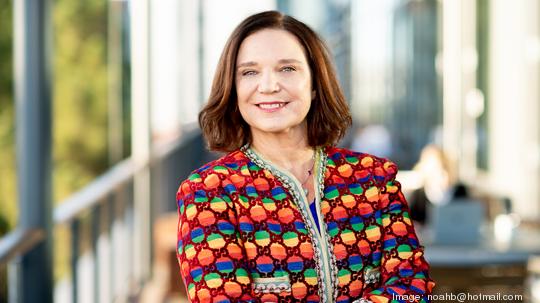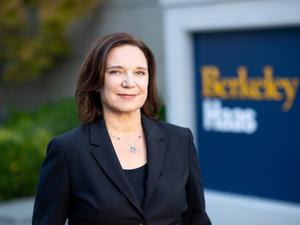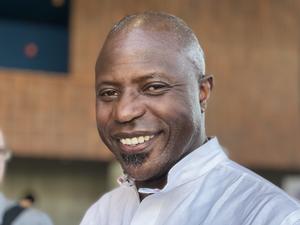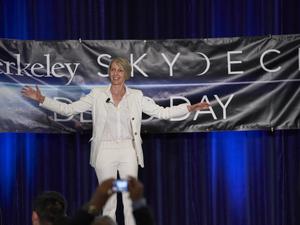
For Ann Harrison, adaptability is one of the most important qualities in a business leader. Technology is constantly evolving, as are consumer and worker expectations. And diversity, equity, inclusion and sustainability are increasingly considered requirements, not optional add-ons, for being successful in business.
Harrison, who has led since 2019, is taking that message to heart. Haas announced Tuesday that it will expand its undergraduate business program from two years to four years thanks to a $30 million gift from Ned and Carol Spieker.
Read on for my interview with Harrison, edited for clarity, and click here to read our Executive Profile of the dean.
Why was Berkeley’s undergraduate business program structured as a two-year program in the first place? We're the second-oldest business school in the United States, and when it was founded, it was actually a four-year program. And then in the 1970s, we redesigned the program as a two-year program, and other schools were also doing that. Now what you're seeing in the entire business school landscape is going back to the four-year model. So essentially, we're going back to how we did business education from the very beginning.
How will the experience differ for students who enroll as a freshman versus starting as a junior? Students would take the prerequisites their first two years, but what was happening since the 1970s is there's huge competition in the first two years because not all the students can get into the program. It’s extremely stressful. Instead of stressing out over whether or not they'll get in after two years, we think it's going to be a much more pleasant and fruitful experience.
So if students didn’t get accepted, then they had to figure something else out halfway through their undergraduate experience? That's right. And now they'll get advising starting from freshman year, and they'll also have more summers to do internships, and they'll have more years to do co-curricular activities and have a more comprehensive experience. What we're seeing happening in business undergraduate education, there's a lot more specialization early on.
How else is Berkeley’s program evolving? Berkeley students really want to make a transformative impact on the world. And they're also very keen on innovation. We're in Berkeley, where we're at the heart of the Bay Area innovation subculture. There's a lot of emphasis in entrepreneurship and innovation. There's a lot more emphasis also on areas for impact. And those include, for example, learning how to lead diverse teams with diversity, equity and inclusion, learning how to mainstream sustainability. We've actually created a new program — a summer minor in sustainable entrepreneurship for undergraduates — so they can really delve deeper into these twin areas of entrepreneurship and sustainability.
In the last four years, we’ve created a number of new undergraduate programs that combine business and other parts of Berkeley. We have a very new successful program that allows you to get a business undergraduate degree and a degree in molecular cell biology. The students are going into biotech. And we have a new program that does same thing with the College of Engineering, so you can get a real deep emphasis in engineering, whether it's computer science or electrical engineering, and business.
Businesses also have to be social media savvy and media savvy, and now businesses even have to learn about NFTs and crypto. What role does emerging technology have in business education right now? Emerging technology is just so critical. It’s really what our students are interested in. And it's also what the U.S. and California is really, really great at — innovation, creating new ideas, new companies, new ways of doing things. We're really trying to train our students for the long run, because what they'll be doing 20 or 30 years from now is probably different from what they're going to do now. They have to learn how to learn.
Do you envision being able to admit more students? Right now we're just focusing on 2024 [when the new four-year program starts]. It will double the size of our undergraduate program because before we were only working with juniors or seniors, some of them transfer students. We'll still have our wonderful transfer program where we take transfer students from community colleges from all over California, and that program will stay because it's really important. We get amazing students. But because we're doubling the size of the program by including freshmen and sophomores, the total number of graduating students will probably not exceed 450 students each year.
What does this $30 million gift mean for the school? Ned and Carol have really made a huge difference. And they've also galvanized the number of other donors to give additional support, significant support. Another $15 million have come in. This is going to allow us to create more scholarships at Berkeley, which is really important.
Why do you think people are donating specifically to Berkeley Haas? We're already ranked in the top three in the country. But I think a lot of people recognize that it would be a much better program, even better than it already is, if it went from two years to four years. And there's lots of anecdotes of wonderful potential students who might have come to Berkeley but didn't because they were worried they wouldn't get into the business program. Wharton and MIT are also four-year programs. We want our students to be able to compete with the best.








